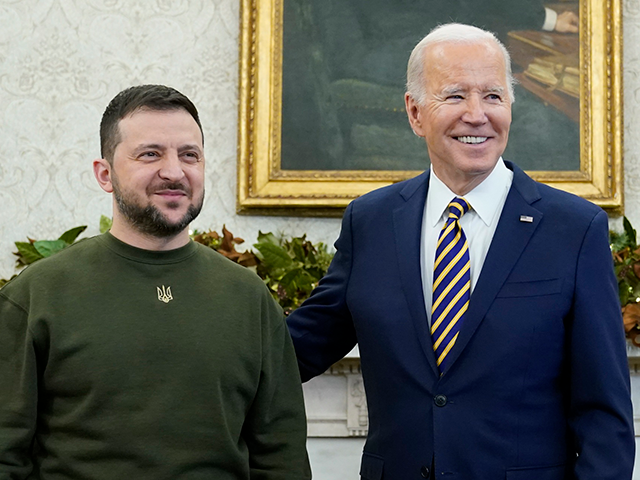The United Kingdom and the Kingdom of Spain have called upon U.S. President Joe Biden to not send cluster bombs to Ukraine amid concerns over the danger they pose to civilian populations.
As Ukraine marked over 500 days since the invasion by Russian forces, significant challenges have been levied against the war strategy of the Biden administration from its NATO allies in Europe, with both the British and Spanish governments urging Washington to back down from its pledge to send cluster bombs into the conflict.
Both the UK and Spain are signatories of the International Convention on Cluster Munitions, which prohibits the use, manufacturing, stockpiling or transfer of the weapon type, however, key holdouts of the treaty are the United States, Ukraine and Russia. Cluster munitions, which are banned by over 100 countries, are a type of rocket, bomb, missile and other projectiles that explode mid-air to rain down on a large area. They have a high risk of failure, which could lead to them landing on ground, only to explode at a later time.
President Joe Biden, 80, justified his “very difficult” decision to send the deadly weapons to Ukraine as the country is “running out of ammunition” and the United States is running low on the 155-millimetre artillery shells to resupply the Ukrainian forces. Therefore, Biden said, the U.S. would provide cluster munitions for a “transition period”, while claiming that they will not be used in civilian areas but merely to break through the entrenched positions of the Russian forces.
This explanation apparently did little in the way of assuaging NATO allies in London and Madrid, however, with both governments asking the Democrat administration to back down.
Speaking to reporters on Saturday, British Prime Minister Rishi Sunak said per the BBC that the UK is a “signatory to a convention which prohibits the production or use of cluster munitions and discourages their use.”
“We will continue to do our part to support Ukraine against Russia’s illegal and unprovoked invasion, but we’ve done that by providing heavy battle tanks and most recently long-range weapons, and hopefully all countries can continue to support Ukraine,” he added.
Zelensky declared that he will not participate in any peace negotiations until Russian forces have left the Donbas and the Crimean Peninsula. https://t.co/k5Q1MVebXT
— Breitbart News (@BreitbartNews) July 3, 2023
Meanwhile, Spanish Defence Minister Margarita Robles said that the decision to send cluster munitions to Ukraine was a unilateral decision taken by the Biden administration and not one agreed to by NATO, of which Spain is a member.
“Spain, based on the firm commitment it has with Ukraine, also has a firm commitment that certain weapons and bombs cannot be delivered under any circumstances,” she said according to Reuters reporters in Madrid.
“No to cluster bombs and yes to the legitimate defence of Ukraine, which we understand should not be carried out with cluster bombs,” Robles added.
The dispute comes ahead of a critical NATO summit in Vilnius, Lithuania next week, during which the prospect of Ukraine’s potential membership into the alliance will be front and centre.
While French President Emmanuel Macron has recently come out in favour of Ukraine joining the alliance, others, specifically Germany and the United States, are hesitant to make any firm proclamations.
Germany, which is in a particularly sensitive position given its economic ties to Russia, will reportedly push back against the idea of making any statement in support of Ukrainian membership in Vilnius, and will instead call upon NATO allies to focus on giving Kyiv security assurances for fear of provoking a full-on conflict between the West and Moscow.
“Berlin is stand-offish at the prospect of offering immediate membership,” a NATO source told London’s Daily Telegraph. “It wants a process and time to develop guarantees to essentially block membership.”
“Berlin doesn’t want to see Vladimir Putin potentially test Article 5,” the source added in reference to the NATO treaty which requires that all parties come to the defence of any member state attacked. There are also concerns about Ukraine’s NATO bid in light of the country’s contested borders, meaning that even if the immediate war is concluded, future border spats with Russia could potentially trigger Article 5.
President Biden seemingly agrees with Berlin, saying that he wants to avoid a situation in which “we’re all in the war, we’re in a war with Russia.” The U.S. leader went on to say that Ukraine is “not ready” to join the alliance and that it is likely “going to take a while”.
Turkey’s Erdogan Backs Ukraine’s NATO Membership Bid in Talks with Zelenskyhttps://t.co/22GkDYAepZ
— Breitbart London (@BreitbartLondon) July 8, 2023

COMMENTS
Please let us know if you're having issues with commenting.